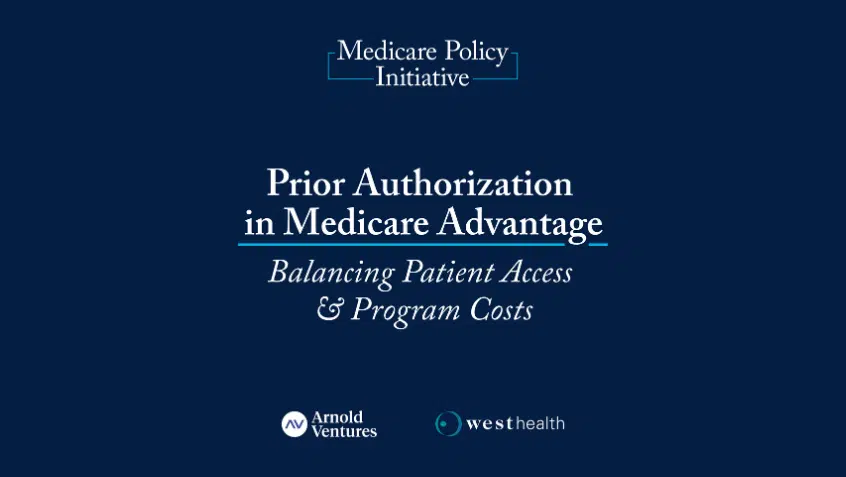Medicare Rights Center President Fred Riccardi Discusses Prior Authorization in Medicare Advantage

Earlier this month, Medicare Rights Center President Fred Riccardi participated in a panel on prior authorization in Medicare Advantage (MA) hosted by the Medicare Policy Initiative, a new hub within the Center on Health Insurance Reforms (CHIR) at Georgetown’s McCourt School of Public Policy. He was joined by Dr. Edward Hu, System Executive Director of Physician Advisor Services at UNC Health, and Molly Turco, former Senior Advisor at the Center for Medicare within CMS. Sabrina Corlette, the founder and co-director of CHIR, kicked off the event, and Carrie Graham, Director of the new Medicare Policy Initiative, moderated.
The event was framed as a conversation on “how to strike a balance between protecting patients’ access to care and containing program costs,” and each panelist brought a unique perspective to the issue.
Mr. Riccardi spoke to the beneficiary point of view, basing his remarks on the experiences of callers to the Medicare Rights Center’s national helpline. Each year, the majority of questions we receive about coverage denials are related to MA. Callers are often struggling with what to do next, from trying to unpack confusing plan communications to navigating the complex MA appeals process.
For all, coverage denials can be extremely stressful and disruptive.
For all, coverage denials can be extremely stressful and disruptive. They can force beneficiaries to choose between seeking other care, paying out of pocket, going without, or getting embroiled in a daunting appeals system. Too often, these denials are inappropriate. And even successful appeals come at a cost, including care delays and negative health outcomes.
Several studies, as well as our own experiences, indicate prior authorization can hinder access to care, and that improper plan decisions are prevalent: while few beneficiaries appeal, most who do are successful. Most recently, a January 2025 KFF report notes, “Though a small share of prior authorization denials were appealed to Medicare Advantage insurers, most appeals (81.7%) were partially or fully overturned in 2023. That compares to less than one-third (29%) of appeals overturned in traditional Medicare in 2022. These requests represent medical care that was ordered by a health care provider and ultimately deemed necessary but was potentially delayed because of the additional step of appealing the initial prior authorization decision. Such delays may have negative effects on a person’s health.”
There are opportunities to reform the current system to not only reduce inaccurate denials but also the likelihood that an enrollee will need to file an appeal in the first place.
As outlined below, there are opportunities to reform the current system to not only reduce inaccurate denials but also the likelihood that an enrollee will need to file an appeal in the first place. Changes to the enrollment process and plan landscape, as well as better plan oversight and more transparency, would improve the coverage environment while simplifying the appeals system and leveling the playing field between MA and Original Medicare (OM) would improve how enrollees experience their coverage.
Enrollment and Plan Selection
One common-sense solution is to make the MA plan selection easier and less risky by ensuring that all plans are high quality and that beneficiaries are maximally empowered to make informed decisions, both initially and annually. This includes standardizing and limiting plan options, having Medicare notify people approaching eligibility about their rights and responsibilities (as outlined in the BENES 2.0 Act), adequately funding State Health Insurance Assistance Programs (SHIPs) to meet growing needs for unbiased Medicare outreach and enrollment counseling, and modernizing Medicare Plan Finder.
Transparency and Oversight
To meaningfully and optimally improve the current system, we need more data and complete transparency about plan practices and outcomes around utilization management and appeals, as well as accurate, understandable resources to help enrollees and other stakeholders work within these structures. More clarity would also enhance plan accountability and allow CMS to design oversight mechanisms and enforcement strategies that target evolving plan behaviors and best encourage accurate initial coverage determinations.
Stronger plan guardrails and consumer protections are also needed. CMS must fully curb plan practices that undermine informed decision-making, like error-riddled provider directories, blanket denials, opaque enrollee communications, empty supplemental benefits, and predatory marketing tactics.
Simplify Appeals
Avoidable denials are problematic on their own, but the associated harms often compound because enrollees don’t always know what to do next. Even those who do may not find a timely resolution, given the complexity of the appeals process. Streamlining this system is long overdue. Critical updates include reducing burdens on all involved, automatically escalating certain claims, and limiting wait times for decisions.
Equalize Coverage
Ultimately, we support making the same benefits and cost protections available to all enrollees. This would help address the problems we see now when beneficiaries want to leave MA for OM but face affordability barriers. They may have initially chosen MA for features OM does not offer, like an overall cost cap and supplemental benefits, but find the trade-offs—like limited provider networks and more frequent denials—are no longer worth it as their needs change. Expanding Medigap buying protections would also help, especially in the interim.
Further Reading
Read more about the event, Prior Authorization in Medicare Advantage: Balancing Patient Access and Program Costs.
Watch the archived event recording here.
Read a companion fact sheet from The Medicare Policy Initiative examining challenges and potential reforms around prior authorization in MA.
The Latest
Most Read
Add Medicare to Your Inbox
Sign up to receive Medicare news, policy developments, and other useful updates from the Medicare Rights.
View this profile on InstagramMedicare Rights Center (@medicarerights) • Instagram photos and videos









